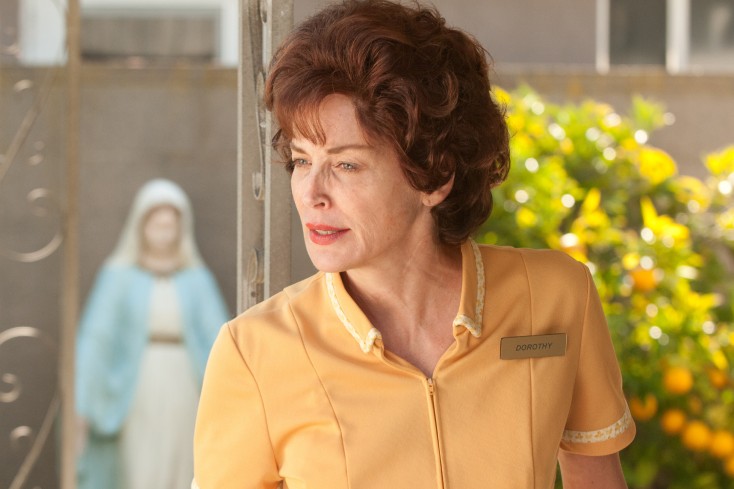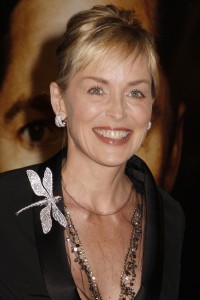By ANGELA DAWSON
Front Row Features
HOLLYWOOD—It’s hard to believe now but there was a time when someone actually told Sharon Stone she wasn’t sexy. Even her manager would warn her that she couldn’t get roles in Hollywood because she was too bookish and dressed too frumpy to be seriously considered. So Stone, on the advice of her friend Marilyn Grabowski, did what any hungry actress would do: she agreed to pose nude for Playboy. Coincidentally, Grabowski was the photo editor at the popular men’s magazine and shortly after Stone’s pictorial was published in 1990 to coincide with the release of her appearance as Arnold Schwarzenegger’s dangerous wife in “Total Recall,” her career took off.
“People then decided, ‘Oh, she’s sexy’, and then I got ‘Basic Instinct,’” recalls the actress, who remains sexy at 55.
Born in Pennsylvania to working class parents, Stone remains a versatile and enigmatic actress, who has appeared in more than 40 films. She was nominated for an Academy Award for her work in “Casino.” As she has matured as a performer, so has her selection of roles.
In “Lovelace,” she is almost unrecognizable as the moralistic and straitlaced mother of ‘70s porn star Linda Lovelace (Amanda Seyfried). Stone dons a short mousy brown wig and wears almost no makeup as Dorothy Boreman, a devout Catholic, who was so strict with her daughter, the girl naturally rebels, winding up in the arms of an abusive and exploitive husband (played by Peter Sarsgaard).
At a recent press conference to promote “Lovelace,” Stone explained why the role of Dorothy appealed to her.
“I’ve been offered to play mothers before, but I didn’t want to just take a stunt mom, and have everybody say, ‘Oh, there’s Sharon, playing a mom. That’s great stunt casting,’” she says. “I wanted to play a mother with some meaning and, for me, this cycle of a dysfunction in a family is meaningful.”
Having started her career in an uncredited role in Woody Allen’s “Stardust Memories,” Stone co-stars with the Wood-man in the upcoming John Turturro comedy “Fading Gigolo.”
Dressed in a sleeveless black cocktail dress and black platform shoes for an interview, Stone spoke about her illustrious career, societal attitudes toward women and her latest film projects.
Q: What led you to “Lovelace?”
Stone: I grew up in the middle of nowhere, Pennsylvania in farm country. I really didn’t have any idea of who (Linda Lovelace) was. Of course, I as I got older I heard of her, but when I read the script, a couple things happened. One, I knew of these directors (Rob Epstein and Jeffrey Friedman) because my long involvement as an AIDS worker, and their beautiful films about the making of the American quilt (the Academy Award winning documentary “Common Threads: Stories From the Quilt”), and the Harvey Milk story ( Epstein’s Academy Award-winning documentary “The Times of Harvey Milk”) were just so special. That’s the kind of special integrity it has to me.
Q: What did you think of Andy Bellin’s script?
Stone: The script just stands on its own as a very good script. It’s an intriguing look at Linda’s life because metaphorically, cinematically, this gives it quite a powerful punch. To see it play out in this way and to see that this mother, though she can look villainous, we also see she was doing the best she could with what she had and what she knew. Coming from dysfunction in her own past, she made mistakes. But she still was a woman that got that dinner on the table every night, and there were still family meals. She loved her husband and worked hard. So even though she failed (as a mother), she still loved her daughter. She was growing and learning and realizing as this was happening. As her daughter was standing up for herself, she was growing too in that movement of women’s rights and the things that today, we’re still striving and fighting to maintain.
Q: Do you think things have changed that much for women since the ‘70s?
Stone: It’s funny that this much later, we’re still struggling to keep those rights. I felt that though it was a story set in the ‘70s, it is still so relevant today. There are many aspects of this story, the structure, that are still true. Peter (Sarsgaard) is such a wonderful, powerful actor. I just thought there were so many elements about this particular project that made it really wonderful and worthwhile.
Q: Your career began the ‘80s, and although this film is about the porn industry rather than mainstream Hollywood, what was your early grasp of Hollywood and its treatment of women? Did you have go through any challenges yourself in terms of dealing with that kind of the old boy network or anything like that?
Stone: Yeah, of course, because it was still very misogynistic when I started. I think it wasn’t until the Anita Hill period, when there were much more stringent behavioral boundaries established in the workplace. It wasn’t just Hollywood. When I was a kid, waitressing and putting myself through school and supporting myself, there weren’t rules (about behavior in the workplace). Your boss could still put his hand up your skirt, and you were really fighting to maintain your dignity and to get through your day at work until women were able to get some sort of actual legal boundaries to protect us in the job place. It wasn’t just Hollywood. It was everywhere. You could go to work as a waitress or a secretary, anything, and have to fight your way through the day.
Q: You didn’t see much difference in terms of being an actress starting out?
Stone: I don’t think it was any different whether you were an actress or working at McDonalds, both of which I did.
Q: Do you feel like there’s any kind of sexual revolution happening right now in American cinema?
Stone: Peter (Sarsgaard, who plays Linda’s manipulative husband Chuck Traynor) said something so wonderful the other day when he said, “When I’m in bed with someone, and I get up to go to the bathroom, I don’t take the comforter with me.” I feel that it’s so disappointing in films when you see the comforter toupee taped to someone’s chest. It takes you out of the scene. It doesn’t protect you from something within the scene. I remember my father asking me when I did “Basic Instinct,” “Do you really have to be naked all the time?” And I’m like, “Well, yeah. I’m playing a sociopathic sexual serial killer.” And he goes, “Yeah. That’s really true.” And I’m like, “So I’d be naked.” So when it has common sense, doesn’t make sense to do something else. It’s really just the costume of your character. So if it is the costume of your character, what else are you going to do? It seems foolish to do something else. If it’s foolish to do something else, then it just distracts the audience. If you’re inauthentically naked, then it’s distracting to the audience. That’s where good judgment comes in of what you should do.
Q: But do you say to yourself, “Thank God, it’s Sharon Stone underneath?”
Stone: In the beginning of my career, I couldn’t get parts because people didn’t think I was sexy or pretty, and Chuck (Binder), who’s been my manager for 30 years. He used to call me up and say, ‘You know, you can’t get that movie because they don’t think that you’re hot.’ I’m such a bookworm, and I’m always like at home and shy in my library. I was like, ‘Oh God, what am I going to do?’ I was always wearing my big black clothes and my glasses and running around with my head in a book. My really good friend Marilyn Grabowski said, ‘You know, you should do a Playboy spread.’ And I’m like, ‘Are you kidding me?’ It seemed so farfetched. And she said, ‘If you tell people you’re sexy, they’ll think you’re sexy. Use your brain.’ So we decided that I would do this Playboy shoot. It was to convince people that I was sexy. When I got “Basic Instinct,” it was this tremendous stretch to turn myself into this super beautiful, sexy character. When I went to see the movie at the theater I was like, ‘Oh my God, look at me! I just look great. Oh, that’s awesome.” My friends were like, “You don’t look like that.” And I’m like, “I don’t, but I could.” Then I figured out how to make myself look like that, but then I couldn’t get out of it, and I endlessly got cast in the sexy parts. (She laughs.) That was fantastic because who doesn’t want to be gorgeous and hot and sexy? But I couldn’t get any other kinds of parts. So it’s taken until now where I start getting these other kind of parts, which are also really fun.
Q: So you didn’t see yourself as a sex symbol?
Stone: You should see me in the morning. It’s not really that friggin’ hot, honestly. I could live in my flannel pajamas forever. My father used to say, “If you don’t get out of that flannel nightgown, nobody’s every going to marry you.” Obviously, I haven’t been too successful on the marriage front, but it’s been fun.
Q: Are you looking forward to working with Woody Allen again on “Fading Gigolo?”
Stone: I already did it. We’re finished. The movie’s quite lovely.






